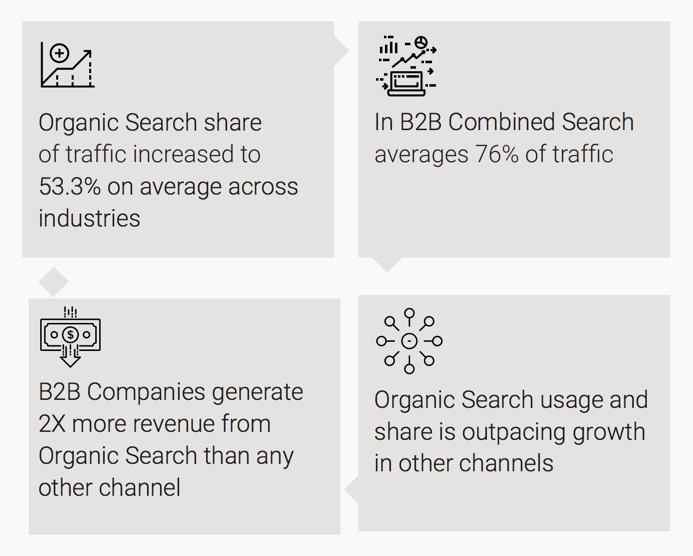
January 2020 ushered in not only a new year but the beginning of a new decade.
And although there are no hard stops and starts as far as eras of innovation go, it’s clear that we’re entering a new realm of enterprise SEO that is going to transform the way we do business.
Enterprise SEO has gone mainstream and become a multi-billion-dollar industry alone.
This new era of enterprise SEO has us moving beyond duplicating our efforts in multiple markets with customizations for broad traits such as language, geopolitics, regional weather trends, and local holidays.
Equipped with the right technology (and people who know how to use it), brands can take advantage of the opportunity to trigger meaningful real-time personalized experiences based on any number of demographics, traits, and/or individual behaviors.
As organic search share continues to grow, this can be replicated and impacts multiple types (all) industries.

The past few years alone have thrown AI, BERT, Hummingbird, and RankBrain into the SEO mix – not to mention massive changes and growth in mobile and voice search.
So, how can you make the most of the search channel in this new era of enterprise SEO?
Here are seven areas of opportunity you don’t want to overlook.
1. Embrace New Opportunities in Every Channel
There is no one-size-fits-all SERP, and one type of content may not even be the best place to answer any given query.
What’s more, there are now hundreds of variations on the search results page.
Brands need to understand their greatest opportunities to appear and convert whether that’s in the Local Pack, on video, in an Instant Answer box or in paid search for any given query.
Beyond search, SEO now often holds the keys to omnichannel marketing success.
Understanding searcher intent is key in delivering the right resource to either answer their question or moves them to the next desired action in the funnel.
Content format and substance must reflect the needs of the consumer whether the message is delivered on mobile or desktop, by voice or text, via social media, SMS text message, or email blast.
Search provides a wealth of data to inform content creation and targeting.
But there’s no possible way to create and optimize dynamic content like this in real-time without a solid underpinning of enterprise SEO software.
2. Embrace Innovation
Is your SEO tech still serving your needs?
A lot of today’s seasoned SEOs came up in the era of having to cobble together disparate solutions, creating their own workarounds to get some semblance of a complete view at their data.
Automation was used to make repetitive tasks less onerous; to free up time spent on auditing, competitive research, etc.
Only the most advanced AI-powered platforms can give us the power to go further, not only gathering data but analyzing massive amounts of it and then taking action, as well.
As consumer behaviors and expectations change, you might find new gaps in your tech’s capabilities. You may identify new data governance issues, permissions needed, or opportunities to engage others in:
- Content creation.
- Listings management.
- Other facets of your SEO strategy.
In addition, point vs. platform is a major consideration nearly every enterprise-level SEO will face at some point as too much data and too many tools cause chaos.
These are all considerations that should be reevaluated on an ongoing basis.
3. Empower Your People
SEOs tend to wear many hats, especially at the enterprise level.
Consider that the typical in-house SEO team consists of just 2 to 5 people, regardless of whether the business has fewer than 100 employees or more than 1,000.
As an SEO, you might have your hands in (and hopefully are consulting on) web design and development, local and mobile marketing, business data analysis, copywriting, email marketing, and more.
Analytical reasoning, Natural Language Processing, business analysis, digital marketing, competitive strategy, data science – these are among the hard skills companies need most right now.
Often, these are the skills of an SEO pro. SEOs are the hybrid marketers that companies need to bring both analytical and creative thinking to a campaign.
Obviously, you need to stay up to speed with the rapid evolution of the search space.
But enterprise SEO teams can also benefit from training in:
- Thought leadership.
- Persuasion.
- Collaboration.
- Other soft skills.
This is especially important as the rest of the organization looks to marketing for insights, as SEO has an opportunity to step up and lead.
0 Commentaires